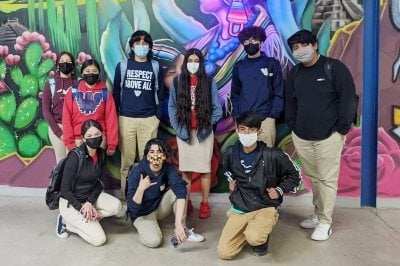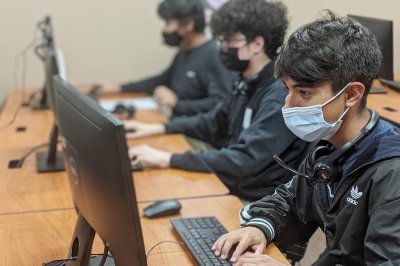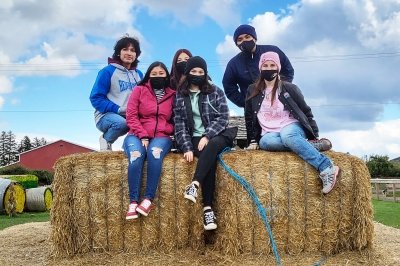Diversity, equity, inclusion, and a sense of belonging are among the most central commitments of Michigan Tech. A College of Computing collaboration with the Detroit Hispanic Development Corporation led high school students to discover their passion for computing and explore the world of opportunities it presents.
Detroit High School Students Learn Programming
Through the leadership of the Detroit Hispanic Development Corporation (DHDC), with Michigan Tech and Ford, eight César Chávez Academy High School students completed an online section of CS1121 Introduction to Programming I in fall 2021. Dual-enrolled, the students earned academic credit from both Michigan Tech and the academy.
In spring 2022, three of the students continued to the next course in the sequence, CS1122 Introduction to Programming II, again dual-enrolled at Michigan Tech. All three (Arnold Contreras, Yahir Corona-Martinez, and Jax Lugo-Rivera) applied and were accepted to begin their undergraduate studies at Michigan Tech in fall 2022.
“I was delighted when we were asked to work with DHDC,” says Linda Ott, emerita chair of Michigan Tech’s Department of Computer Science. “It’s always rewarding to participate in outreach that provides high school students a chance to discover their passion for computing. It opens a world of opportunities for them. Students who are exposed to programming in high school are much more likely to pursue a degree in computer science.”
The students met daily, attending live online lectures instructed by Department of Computer Science Assistant Professor Briana Bettin, and live online lab sessions conducted by Michigan Tech students. The DHDC transported the students from the academy to the DHDC, provided classroom space for the lectures and associated labs, and offered many other forms of student support.
Webcams and headsets were donated by the College of Computing, and Ford covered half the cost of the students’ tuition. The remaining tuition was funded by the academy.
The response from the academy students has been enthusiastic. “The students really opened up, chatting and joking, as well as asking insightful questions and engaging with the lecture even while remote,” says Bettin. “They were excited and vibrant, and I felt like I had become part of a club as they started to open up and share their energy and their personalities with me.”
“Dr. Bri is an amazing instructor. She was the perfect choice for this program,” says Leah Goodwin, director of STEM education and career pathways at the DHDC. “I can’t tell you how pleased I’ve been with MTU’s willingness to accommodate our needs.”
“I was grateful to make it possible for these students to actually take a CS program through a university that’s ranked No. 1 on some lists,” says Goodwin. “That was huge. It really made it relevant and impactful for the students.”
Academy student Lugo-Rivera has always been interested in computer science, and after completing an introductory computer programming class their sophomore year, their interest grew. “I really like the ability to create things from nothing,” they say. “I like being able to get all these ones and zeros together and create something.”
“I like the problem-solving aspects of computer science,” says Corona-Martinez. “I also like the collaborative aspect of computer science and sharing ideas with one another.”
The Michigan Tech courses aren’t easy, and the students have had challenges to overcome. “Sometimes, the concepts would be a bit difficult, but I would make the effort to watch a YouTube video or read additional documentation about how the code works,” says Corona-Martinez.
The academy students agree that it’s important to complete a bachelor’s degree. “Just getting a job after high school doesn’t feel right for me,” says Contreras. “Going to college and and then getting a job suits me better.”
Help from Ford
In 2019, Goodwin channeled some of her passion for STEM to apply for a grant from Ford, proposing that the DHDC become an adjunct STEM educational facility to offer science, technology, engineering, and math courses through student dual-enrollment.
“Teaching shortages exist, so we can’t just credential teachers to teach these classes,” Goodwin notes. “The idea was that, since we are a community nonprofit facility, we should be able to bring our programming to a broader audience through facilitating the college classes.”
The Ford grant was awarded, with a request from Ford to focus on computer science outreach. Goodwin began reaching out to area colleges, connecting with Michigan Tech through the DHDC’s already-established relationship with MTU’s Summer Youth Programs.
The Learning Lab
Computer science PhD student Kieran Young led the learning lab for the class. “Kieran absolutely rocked working with the students, but it was clear he could benefit from having some extra hands on deck,” says Bettin. “We were able to bring in two amazing undergrad assistants, Marie Zgurich and Katie Ulinski, to be lab assistants for these students.”
“Helping out with the class was a great opportunity and the students were awesome,” Ulinski says.
“It always made me happy to see how excited they were when they got a program to run correctly. It also made me happy to hear that a few of them are thinking about coming to MTU once they graduate,” she adds.
A Special Visit
Bettin visited the academy students during the eighth week of the semester. “I was able to tour their high school, ride back with them to DHDC, help them out, answer questions about college during their class session, and even go on a trip with a few of them to a cider mill to spend a bit more time getting to know them!”
“I marveled as the students shared with me about their neighborhood and their school, and their day-to-day experiences that were so different from mine,” Bettin reflects. “In the same way, they marveled as I described how baling hay is a common summer job out on the farms, and what that job entails. The way the field trip let me share things from my world with them, just as they were sharing with me things from their world, was so unexpected and wonderful. It wasn’t a computer science learning moment—it was a human learning moment.”
In her research, Bettin is intrigued by how we communicate in a sociotechnical society, both about and with technology.
“We live in an increasingly technological society, and its impacts affect everyone. Far too much technology is developed without consideration of the real experiences and needs of those who aren’t present in the room,” says Bettin.
“Creating more diverse teams—teams that bring in more diverse perspectives— encourages building better solutions,” Bettin adds. “These solutions take into account cases that would have gone unnoticed by a team without that perspective, resulting in a more innovative and objectively better outcome at launch.”
"College graduates with a computer science degree have a world of opportunities available to them,” says Ott. “The diversity of career opportunities is astounding. There is a huge demand for software engineers in the automotive industry, and many other industries.”
All Topics Considered
From the opening reception and induction of the first members of the College of Computing Honor Academy the evening of April 4 to a Visualizations in Python workshop with Associate Professor Laura Brown on April 6, the first annual Computing[MTU] Showcase engaged hundreds of individuals in a full slate of talks, workshops, panel discussions, and research poster session.
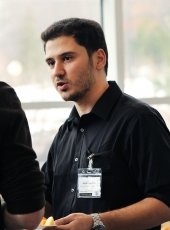
Keynote talks were delivered by Dianne Marsh ’86 ’92, director of content security at Netflix, and by data science expert Phil Bourne of the University of Virginia.
In two discussion panels, diverse groups explored the ever-increasing role of computing in everyone’s lives and the challenges and opportunities for women in IT.
Conference sessions found distinguished alumni and industry professionals sharing information and ideas about data science in the defense sector, machine learning, health information modeling, and graduate education programs.
In a poster competition, close to 40 students presented their research. Winning posters described projects investigating a universal sensor description schema, virtual keyboards using a HoloLens, and a system to broaden access to digital assistance.
A Commitment to Diversity
“The founding of the College of Computing in 2019 presented an excellent opportunity for the College to reaffirm its commitment to student diversity,” says Linda Ott, emerita chair of the computer science department.
And University goals underscore that: By 2045, Michigan Tech envisions a student body with many more women. In its Broadening Participation in Computing (BPCnet.org) plan, the computer science department sets out its own diversity goals.
- Goal 1: By 2025, increase the number of women who graduate from our degree programs and by 2030, match the overall graduation percentage at MTU.
- Goal 2: By 2025, increase the percentage of African American, Hispanic, and Native Americans students in our BS programs.
- Goal 3: Encourage more faculty involvement in BPC activities.
Alumna Empowers Universities with Enrollment Analytics
Even as she was completing her bachelor’s degree, Michigan Tech alumna Ashley Kern ’15 ’17 had already set out on an entrepreneurial path. And before she completed her MS in Data Science, in 2016, she started SightLine, a growing market intelligence and predictive analytics consulting firm.
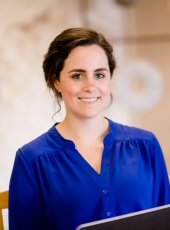
Kern pursued a bachelor’s in geological engineering at MTU through her junior year, but she wasn’t certain it was the right fit. So, she took some time off to think things over, returning home for a semester.
To fill her time, Kern began working on some projects for her father, John Kern, an independent data analysis and research consultant. She started learning computer code and found that she enjoyed it.
“Working with my dad for that time, I discovered that I liked the flexibility of consulting work. I liked problem-solving in a less structured way because you get to do it independently.”
When Kern returned to Michigan Tech the next semester, she changed her major to mathematics, completing her BS in just one additional semester. But she felt that she needed additional credentials to pursue the kind of entrepreneurial work she now knew she wanted. It was great timing that Michigan Tech had just launched its Master of Science in Data Science degree program.
During her first year as a graduate student, Kern started looking around for some consulting work. She enrolled in a SmartStart class at the MTEC Smart Zone, Houghton, and “through the grapevine,” Michigan Tech Vice President for University Relations and Enrollment John Lehman heard that Kern was looking for data science consulting work.
“As VP for enrollment, John is very data-focused, so he really digs in,” says Kern. “He had some complex problems that nobody else was really tackling, and he gave me some tough questions to solve. That was my very first contract in higher education and it all grew from there.”
Today, Kern is the CEO of SightLine, which develops predictive models and data assessments to help universities increase enrollment, retention, and overall net revenue. The company uses machine learning to give schools insight into what kind of aid a school should offer a particular student, and how the school’s financial metrics compare with those at nearby colleges.
SightLine’s chief operating officer is Michigan Tech alumna Erin Thompson ’02, who joined the company full-time in 2020.
“We’re looking long-term to help smalland medium-sized educational institutions maintain and grow sustainably, and to share new ideas and fresh perspectives,” Kern says. “What our customers repeatedly tell us is that they’ve been working with the same types of predictive analytics and data and education management companies for a long time, and they feel that they’re receiving the same responses and solutions.”
This fall, SightLine introduced a new solution to help parents understand what they can expect to pay for tuition based on their children’s grades and extracurricular activities, instead of relying on the sticker price posted on a school’s website.
“The goal of the new platform is to make education more accessible and to help with price transparency,” Kern says. “Parents and students don’t always understand the full value of higher education.”
SightLine began talking with general and tech-specific venture capital groups this summer in a multi million-dollar fundraising effort. In July, the company was featured in a Crain’s Detroit Business article focused on a small-business boom in the Upper Peninsula.
Kern was pleased to learn more about the recent growth of the College of Computing and the data science MS during a recent visit to campus. “It’s great to see how it’s growing and evolving and becoming a staple of campus,” she says.
Briana Bettin: Amazing Achievements
Assistant Professor Briana Bettin of the computer science and cognitive and learning sciences departments was awarded the 2021 Michigan Tech Distinguished Teaching Award. In one year, Bettin accomplished more than many professors do in a decades-long career.
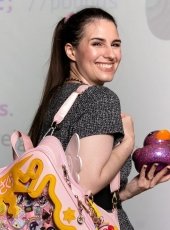
Also this academic year, Bettin was inducted into the Michigan Technological University Academy of Teaching Excellence, which recognizes those who have demonstrated continued dedication to and support of the University’s teaching mission. She received a Deans’ Teaching Showcase Award in January 2022.
“We couldn’t be prouder of Briana and her accomplishments. In her short time here, she has quickly become one of the very best educators that we have at Michigan Tech,” says Dennis Livesay, Dave House Dean of Computing.
Livesay describes Bettin as a dedicated teacher with amazing rapport with her students and excellent teaching evaluations. Further, he notes that her student evaluations have been consistently in the top 10 percent, which he finds impressive for a second-year instructor charged with teaching large sections of introductory programming courses.
Department of Computer Science Emerita Chair Linda Ott attributes Bettin’s success as a teacher to her enormous energy.
In Ott’s words, Bettin “works hard to engage students through in-class activities. She really cares about the students and makes sure that they know it. And she makes learning fun by using amusing props such as little rubber ducks in her class. It turns out that these props also give the students something very tangible to help them remember the abstract concepts that we deal with in introductory programming courses.”
“Briana is very concerned about reaching all of her students,” Ott adds. “She really understands that not all of our students are ‘just like us,’ and she regularly participates in programs that focus on addressing issues of systemic racism and bias.”
“Dr. Bri goes out of her way to make students feel welcome, included, and valued,” says one of Bettin’s students. “She sparks a perfect balance between showing students empathy and leniency while upholding the prestige of our institution and facilitating the excellence in education that MTU is known for.”
"Creating more diverse teams—teams that bring in more diverse perspectives— encourages building better solutions."
A graduate teaching assistant (GTA) supervised by Bettin echoes this focus on inclusion: “Dr. Bri is a fierce advocate for justice in the classroom; she ensures a high level of coordination between GTAs so students are graded with fairness.”
Bettin completed her PhD at Michigan Tech in August 2020. In Fall 2020, she was hired as an assistant professor for the Department of Computer Science. Her research interests include user experience, human factors, human-computer interactions, and mental models. She is a member of the Institute of Computing and Cybersystems’ Centers for Computing Education and Human-Centered Computing.
“I am so grateful and humbled to see my efforts have value to others,” Bettin says. “I hope I can continue to have an impact.”
Women in Computer Science
“Young women don’t always have opportunities to learn about computing careers or to meet role models in the field,” says Linda Ott, emerita chair, computer science. “And without that, many don’t gain the background to consider computing as a career option.”
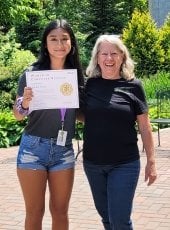
To change that, since 2000, Women in Computer Science (WiCS), a weeklong Summer Youth Programs exploration, has reached high school-age girls with the message that computing careers are for women, too.
Organized by Ott and the computer science department, WiCS has helped dozens of high school girls learn more about computing and the exciting opportunities it can offer.
“Careers in computing can be fun, rewarding, and well-paying,” says Ott. “If we are a just society, young women should have equal access to the field.”
And diversity benefits industry, as well. “We’ve seen lots of examples of software products that work well for only a portion of the population,” says Ott. “Industry benefits significantly from a more diverse workplace.”
The exploration is offered without cost to students. Scholarships are funded by alumni and companies such as Ford and IBM.
Michigan College and University Partnership Program
The best approach to succeeding in STEM disciplines is to learn by doing. And this summer, a cohort of community college students did just that through the Michigan Tech MiCUP (Michigan College and University Partnership) program. Three of those students were mentored by College of Computing faculty.
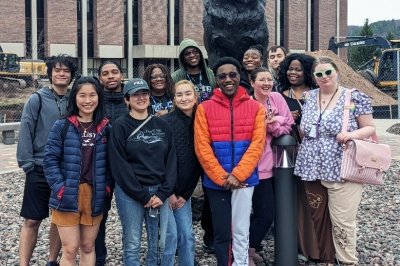
The MiCUP students spent seven weeks on campus, working on a research project one-on-one with their faculty mentor and learning what it’s like to live and study on a university campus.
MiCUP funds housing and meals in a Michigan Tech residence hall, a scholarship for a 1-credit University summer course, a stipend, and an opportunity to develop a professional research poster with a faculty member.
The program aims to help make the transition to a four-year university an achievable goal for low-income students and students who are the first in their families to attend a four-year college.
Marco Britton
Marco Britton, a second-year student majoring in cybersecurity at Wayne County Community College, was mentored by Yu Cai, a professor of cybersecurity in the Department of Applied Computing. Titled “Raspberry Pi - A Tool For Cybersecurity,” Marco’s project aimed to demonstrate how Raspberry Pi can be used as an introductory tool for learning cybersecurity, particularly for college and K-12 students.
Raspberry Pi is a low-cost, credit-card-sized computer that enables the exploration of computing and learning how to program in languages like Scratch and Python.
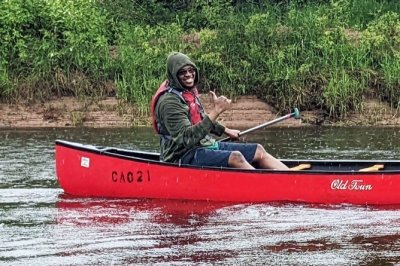
To demonstrate Raspberry Pi coding capabilities, Marco developed a clicker game using Scratch, a platform that allows use of building blocks, animation, and graphics to write games and programs. He also developed a dice game to demonstrate Raspberry Pi coding capabilities using Python, a language for writing scripts and automated programs.
And he coded a wireless signal scanner to build a dummy Wi-Fi network, monitor network traffic, and crack Wi-Fi network passwords using AirCrackNg, a tool that monitors wireless signals, cracks passwords, and hacks into wireless networks.
Marco also investigated password security, interviewing students and faculty members, and discovering that using the same passwords on multiple websites is a common security vulnerability.
“Marco is self-motivated and very interested in cybersecurity,” says Cai. “He has a clear vision for his future career pathway.”
“I have gotten tremendous help from Professor Yu Cai and his graduate student, Brandon Cox,” writes Marco on his research poster. “They are very knowledgeable, patient, and friendly. I would also like to thank the MiCUP program for giving me the opportunity to learn more about cybersecurity at Michigan Tech.”
Alec Mirambeau
Alec Mirambeau, a computer science major at Grand Rapids Community College, worked with Leo Ureel, an assistant professor of computer science. For his MiCUP research, Alec explored computational methods to automatically solve a Wordle puzzle, a simple online word game that challenges people to find a five-letter word in six or fewer guesses.
The project, titled “Solving Wordle Using AI,” explores several methods of solving the puzzles, with the aim of developing curriculum materials for MTU’s CS 4811 Artificial Intelligence course.
Ultimately, Alec concluded that it is possible to use AI to solve Wordle puzzles. He also spent a lot of time studying Python’s tools and gained a better understanding of Python concepts.
“Learning about these AI algorithms and then creating one is incredibly beneficial,” writes Alec on his research poster. “It forces us to gain a better understanding of Python and how it works.”
“Alec was an enthusiastic participant. He explored several ways of solving the puzzle and learned a lot about Python, programming, and AI,” says Ureel. “It was a pleasure working with him.”
DeAndre’ Neal
DeAndre’ Neal, a cybersecurity major at Wayne County Community College, was mentored by Bo Chen, associate professor of computer science. For his research, DeAndre’ learned about the metaverse and blockchain, and clarified the relationship between them. Then he investigated how blockchain enables NFTs (non-fungible tokens), which are used to represent ownership of unique items, such as art, real estate, collectibles, and games.
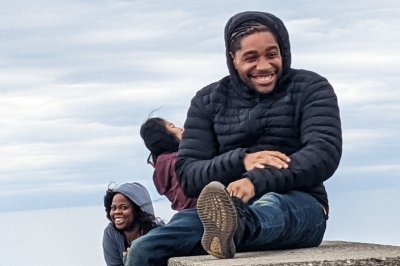
With content analysis techniques and comparison of content, DeAndre’ gathered relevant research journals to learn about the ways blockchain enables NFTs to enhance the metaverse experience.
He learned that blockchain is a digital ledger of transactions that is duplicated and distributed across an entire network, and that the metaverse is a next generation internet that aims to create 3D environments where metaverse users can interact via a digital avatar. The metaverse connects the physical world with the virtual world and allows avatars to perform activities such as creation, display, entertainment, social media, and trading.
DeAndre’ concluded that the metaverse will create jobs, enhance social media experiences, and provide a platform to create wealth.
“Blockchain technology protects the information of users, allowing seamless transactions to take place in the metaverse,” DeAndre’ explains on his research poster. “Unlike cryptocurrency, NFTs are non-interchangeable and cannot be divided, which increases their value.”
“DeAndre’ did a great job in understanding NFT,” says Chen.
MiCUP is a collaborative effort among three Michigan community colleges and Michigan Tech. Since 2012, the outreach program has hosted 189 students at Tech. Funding is shared by the King-Chávez-Parks program (70 percent) and Michigan Tech. Delta College, Grand Rapids Community College, and Wayne County Community College District are Michigan Tech’s partners in MiCUP.
Developing Solutions to Prepare Students for the 21st Century
A guest editorial by Wayne Gersie, vice president for diversity and inclusion.
In her book, Algorithms of Oppression: How Search Engines Reinforce Racism, Safiya Umoja Noble tackles a continuing challenge that transcends academic disciplines and professions: that search engine results reinforce racism by queuing up websites that engender negative racial stereotypes. Noble is well qualified for this analysis as a professor of gender and African American studies at UCLA, where she was the co-founder of the UCLA Center for Critical Internet Inquiry.
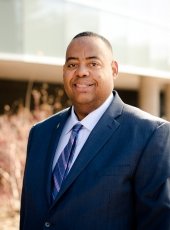
Her publication is specific to the relationship between search engines and discriminatory biases, but it is only one among many problems surrounding technology design and inclusivity that will continue until we confront it in the academy and workforce.
One facet of this issue regards demographic shifts, both domestically and globally, that will require innovative and inclusive thinking to meet market and end-user demands. According to the most recent census data, “the U.S. population is much more multiracial and diverse than what we measured in the past” (Jensen et al., 2021). Further, “The nation is diversifying even than predicted, according to new census data” (Frey, 2020).
These positive trends are diluted by access inequities related to computing and education. While 53 percent of high schools now offer computer science courses, and 76 percent of high school students overall could take these courses, only 5.6 percent students enroll in them (Ward, 2022). Further, demographic disparities persist: young women only constitute 32% of high school computer science courses, two or more races, 4 percent, and Native American/Alaskan and Native Hawaiian/ Pacific Islander, 1.3 percent.
Also, comparing the overall high school population of various demographic groups to their enrollment in computer science courses, we find economically disadvantaged students at 52 percent to 36 percent, Latinx 27 percent to 20 percent, White 48 percent to 48 percent, Black 15 percent to 16 percent, and Asian 5 percent to 11 percent (Ward, 2022; Tamez-Robledo, 2022). While some progress has occurred, obviously, much work remains.
The downstream impact is revealed in post-secondary education and workforce development. In 1984, women accounted for 37 percent of computer science college graduates, but more recently this percentage has declined to around 20 percent (Cheryan, S. et al., 2022). Not surprisingly, the percentage of women employed in computer science lags behind recent, though modest, gains for women in other STEM fields (Pew Research Center, 2021).
Employment data for diverse racial/ethnic groups follow similar patterns, with the percentage of Black computer scientists typically hovering between 3 percent and 5 percent from 2010-19, Asian increasing from about 15 percent to 20 percent, and Latinx with a small gain from about 3 percent to 5 percent (Zippia, 2022).
About the Center for Diversity and Inclusion
The mission of the Center for Diversity and Inclusion (CDI) at Michigan Tech is to foster student success by providing engaging programs that create safe spaces for students of multiple social and cultural identities. Through a broad range of services, workshops, and events, CDI fosters student success by:
- Providing a welcoming and safe environment for all students
- Encouraging cross-cultural interactions and conversations
- Supporting the exploration of differences as well as similarities
- Recognizing and celebrating the contributions of historically marginalized populations
- Facilitating students’ self-exploration and exploration of others’ identities
- Collaborating on campus initiatives that support/foster cultural diversity
As a leader of the Fourth Industrial Revolution, Michigan Technological University and our newly minted College of Computing accept the charge to prepare students for the 21st century. We must increase the representation of women and diverse racial/ethnic groups in computer science and ensure that our graduates are not only technically, but also culturally proficient and equity minded to develop solutions for next-generation challenges.
At its core, the College of Computing leverages its expertise to facilitate complex problem-solving that requires imagination and innovation. To the degree that the College can augment its inclusivity profile among all its students, especially among students with diverse backgrounds and lived experiences, it will more successfully achieve its goals.
To achieve these aspirations, we must expedite the integration of diversity, equity, inclusion, and sense of belonging (DEIS) into the fabric of the College and University as not only the right thing to do, but the smart thing to do. By celebrating diverse perspectives and lived experiences, along with the uniqueness of our community members, we provide everyone with opportunities to thrive and enhance our ability to innovate and conduct transformational research for the betterment of humanity.
Having the privilege of serving as Michigan Tech’s inaugural vice president for diversity and inclusion and the opportunity to partner with the inaugural dean of the College of Computing, Dennis Livesay, along with his team, I am excited about the possibilities for Michigan Tech’s fastest-growing college. Specifically, I look forward to partnering with the College as it develops its strategic plan for DEIS, future K-12 outreach partnerships, and research collaborations with its faculty and academic and business partners.
References
Cheryan, S., Master, A., Meltzoff, A. (2022, July 27). There are too few women in computer science and engineering.
Scientific American. Frey, W. H. (2020, July 1). The nation is diversifying even faster than predicted, according to new census data. Brookings.
Jensen, E., Jones, N., Rabe, M., Pratt, B., Medina, L., Orozco, K., & Spell, L. (2021, August 12). The chance that two people chosen at random are of different race or ethnicity groups has increased since 2010. United States Census Bureau.
Noble, S. U. (2018). Algorithms of oppression : How search engines reinforce racism. New York University Press.
Pew Research Center. (2021, March 30). Women remain underrepresented in physical sciences, computing and engineering jobs.
Tamez-Robledo, N. (2022, September 26). Computer science is growing in K-12 schools, but access doesn’t equal participation. EdSurge.
Ward, M. (2022, September 27). Numbers don’t lie: Is it time for schools to require computer science? District Administration.
Zippia. (2022, Sep. 9). Computer scientist demographics and statistics in the U.S.
About Wayne Gersie
Prior to joining Michigan Tech, Wayne Gersie served as assistant research professor and chief diversity officer for the Applied Research Laboratory at Pennsylvania State University. He is the founder and principal of Oasis Strategic Consulting LLC.
Gersie earned his PhD in Workforce Education and Development, with an emphasis on human resources, and a MEd in Counselor Education, both from Penn State. He holds certificates from the Harvard University Institute for Management and Leadership Education, Cambridge, Massachusetts, and the Center for Creative Leadership, Colorado Springs, Colorado.
Gersie has been recognized for his service with multiple awards, including the Pennsylvania State University College of Engineering Ally Recognition Award, the Penn State Engineering Alumni Society Equity and Inclusion Award, and the Penn State Multicultural and the Resource Center Faculty/Staff Diversity Recognition Award. He has also served his community, regionally and nationally, as a committee member, panelist, and keynote speaker for many organizations.
Michigan Technological University is an R1 public research university founded in 1885 in Houghton, and is home to nearly 7,500 students from more than 60 countries around the world. Consistently ranked among the best universities in the country for return on investment, Michigan's flagship technological university offers more than 185 undergraduate and graduate degree programs in science and technology, engineering, computing, forestry, business, health professions, humanities, mathematics, social sciences, and the arts. The rural campus is situated just miles from Lake Superior in Michigan's Upper Peninsula, offering year-round opportunities for outdoor adventure.

